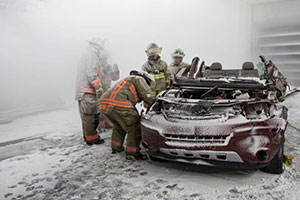ACE helping to make firefighting a safer occupation
UOIT’s capacity for unique testing plays a key research role
July 17, 2015

Firefighting has long been one of the most physically challenging careers. As first responders, firefighters always face an element of risk: there is never a complete guarantee of fully knowing all of the potential dangers when they first arrive at a scene. The good news is that there is exciting new research underway at the University of Ontario Institute of Technology (UOIT) to make firefighting a safer occupation.
The university has partnered with Toronto Fire Services in a unique research collaboration to examine the physical effects of harsh climatic conditions on the human body, specifically as they apply to firefighters on the job. The research findings will provide new insight into safer working practices and appropriate techniques to minimize safety risks for firefighters everywhere.
Of course, harsh temperatures or extreme weather conditions don’t come along every day. The solution comes from ACE, a $100 million climatic testing facility at the university, which can instantly simulate any climatic condition on the planet, from sweltering jungle downpours to the paralyzing cold of an arctic storm.
“The controlled made-to-order climate environments that ACE can create are perfect for this various stress simulation tests in this study,” says researcher Michael Williams-Bell, an Applied Bioscience PhD candidate in the university's Faculty of Science. “The initial research occurred in a scorching hot and humid climate chamber with the temperature cranked up to 35 Celsius. Firefighters in full gear were pushed to their limits on a treadmill and we recorded the effects of the exercise on cognitive function.”
Through basic cognitive function tests and a fire ground simulation video game, Williams-Bell and the research team observed the level of core body temperature where cognitive impairments were occurring. Researchers will later compare findings against the length of time firefighters are capable of working in hot environments.
“If these tests can accurately assess a firefighter’s cognitive ability, it could help us develop a viable training option that requires minimal expense and equipment to improve appropriate work practices,” said Williams-Bell.
At the other end of the spectrum, firefighters often respond to accident scenes in the dead cold of winter. Once again, ACE was able to provide the perfect test environment by serving up a blizzard in minus 20 Celsius conditions inside its climatic wind tunnel. Researchers were interested in the effects of extremely cold conditions on the physical and physiological demands of auto extrication in firefighting.
“For this test we simulated collision scene on a cold and snowy Canadian highway,” said Williams-Bell. “A team of firefighters performed auto extrication in intense cold. These findings will pave the way for other human trials and health science research in the extreme climates available at the one-of-a-kind ACE climatic testing facility.”
“We are always interested in research because it always has an impact on how effective we are on the fire ground, our own safety and the public we are protecting,” said Andrew Kostiuk, Division Commander, South Command, Toronto Fire Services. “Anything that progresses new ways of doing things, new equipment or new training procedures – that will make us more effective on the fire ground.”
ACE plans on working with more experts to expand research in firefighting and discover new ways to increase the safety of of EMS workers and others in similar professions. ACE has a strong history of collaborating with industry partners to develop and implement successful research projects in a wide variety of disciplines.
For more information about ACE, please contact:
Colin Howard
ACE Business and Marketing
289.688.0930
colin.howard@uoit.ca



